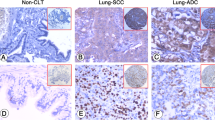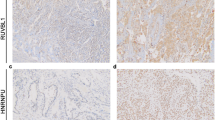Abstract
Proapoptotic BH-3-only protein Bad (Bcl-Xl/Bcl-2-associated death promoter homolog, Bad) initiates apoptosis in human cells, and contributes to tumorigenesis and chemotherapy resistant in malignancies. This study explored association between the Bad expression level and prognosis in patients with non-small cell lung cancer (NSCLC). In our study, a cohort of 88 resected primary NSCLC cases were collected and analyzed. Bad expression level was determined via immunohistochemical staining assay. The prognostic significances of Bad expression were evaluated with univariate and multivariate survival analysis. The results showed that compared with normal lung tissues, Bad expression level significantly decreased in NSCLC (P < 0.05). Bad expression was associated with adjuvant therapy status. Loss of Bad independently predicted poor prognosis in whole NSCLC cohort and early stage subjects (T1 + T2 and N0 + N1) (all P < 0.05). Overall survival time was also drastically shortened for Bad negative phenotype in NSCLC patients with smoking history, especially lung squamous cell carcinoma (all P < 0.05). In conclusion, this study provided clinical evidence that loss of Bad is an independent and powerful predictor of adverse prognosis in NSCLC. Bad protein could be a new biomarker for selecting individual therapy strategies and predicting therapeutic response in subjects with NSCLC.





Similar content being viewed by others
References
Jemal A, Siegel R, Ward E, Hao Y, Xu J, Thun MJ. Cancer statistics, 2009. CA Cancer J Clin. 2009;59(4):225–49.
Singhal S, Vachani A, Antin-Ozerkis D, Kaiser LR, Albelda SM. Prognostic implications of cell cycle, apoptosis, and angiogenesis biomarkers in non-small cell lung cancer: a review. Clin Cancer Res. 2005;11(11):3974–86.
Han SW, Roman J. Targeting apoptotic signaling pathways in human lung cancer. Curr Cancer Drug Targets. 2010;10(6):566–74.
Kuroda J, Taniwaki M. Involvement of BH3-only proteins in hematologic malignancies. Crit Rev Oncol Hematol. 2009;71(2):89–101.
Hanahan D, Weinberg RA. The hallmarks of cancer. Cell. 2000;100(1):57–70.
Brown JM, Attardi LD. The role of apoptosis in cancer development and treatment response. Nat Rev Cancer. 2005;5(3):231–7.
Cory S, Adams JM. The Bcl2 family: regulators of the cellular life-or-death switch. Nat Rev Cancer. 2002;2(9):647–56.
Maiti D, Bhattacharyya A, Basu J. Lipoarabinomannan from Mycobacterium tuberculosis promotes macrophage survival by phosphorylating Bad through a phosphatidylinositol 3-kinase/Akt pathway. J Biol Chem. 2001;276(1):329–33.
Downward J. How BAD phosphorylation is good for survival. Nat Cell Biol. 1999;1(2):E33–5.
Datta SR, Katsov A, Hu L, Petros A, Fesik SW, Yaffe MB, et al. 14-3-3 proteins and survival kinases cooperate to inactivate BAD by BH3 domain phosphorylation. Mol Cell. 2000;6(1):41–51.
Gilmore AP, Valentijn AJ, Wang P, Ranger AM, Bundred N, O’Hare MJ, et al. Activation of BAD by therapeutic inhibition of epidermal growth factor receptor and transactivation by insulin-like growth factor receptor. J Biol Chem. 2002;277(31):27643–50.
Ranger AM, Zha J, Harada H, Datta SR, Danial NN, Gilmore AP, et al. Bad-deficient mice develop diffuse large B cell lymphoma. Proc Natl Acad Sci USA. 2003;100(16):9324–9.
Sinicrope FA, Rego RL, Foster NR, Thibodeau SN, Alberts SR, Windschitl HE, et al. Proapoptotic Bad and Bid protein expression predict survival in stages II and III colon cancers. Clin Cancer Res. 2008;14(13):4128–33.
Seow HF, Yip WK, Loh HW, Ithnin H, Por P, Rohaizak M. Immunohistochemical detection of phospho-Akt, phospho-BAD, HER2 and oestrogen receptors alpha and beta in Malaysian breast cancer patients. Pathol Oncol Res. 2011;16(2):239–48.
Liu D, Huang Y, Chen B, Zeng J, Guo N, Zhang S, et al. Activation of mammalian target of rapamycin pathway confers adverse outcome in nonsmall cell lung carcinoma. Cancer. 2011;117(16):3763–73.
Travis WD, Brambilla E, Muller-Hermlink HK, Harris CC. World Health Organization classification of tumours. Pathology and genetics of tumours of the lung, pleura, thymus and heart. Lyon: IARC; 2004.
UICC IUAC. TNM classification of malignant tumours, 6th ed. New York: Wiley; 2002.
NCCN. NCCN Clinical practice guideline in oncology-non-small cell lung cancer guideline 2004. http://www.nccn.org (2004).
Tang JM, He QY, Guo RX, Chang XJ. Phosphorylated Akt overexpression and loss of PTEN expression in non-small cell lung cancer confers poor prognosis. Lung Cancer. 2006;51(2):181–91.
Yoshizawa A, Fukuoka J, Shimizu S, Shilo K, Franks TJ, Hewitt SM, et al. Overexpression of phospho-eIF4E is associated with survival through AKT pathway in non-small cell lung cancer. Clin Cancer Res. 2010;16(1):240–8.
Yu B, Sun X, Shen HY, Gao F, Fan YM, Sun ZJ. Expression of the apoptosis-related genes BCL-2 and BAD in human breast carcinoma and their associated relationship with chemosensitivity. J Exp Clin Cancer Res. 2011;29:107.
Al-Bazz YO, Underwood JC, Brown BL, Dobson PR. Prognostic significance of Akt, phospho-Akt and BAD expression in primary breast cancer. Eur J Cancer. 2009;45(4):694–704.
Kuroda J, Puthalakath H, Cragg MS, Kelly PN, Bouillet P, Huang DC, et al. Bim and Bad mediate imatinib-induced killing of Bcr/Abl+ leukemic cells, and resistance due to their loss is overcome by a BH3 mimetic. Proc Natl Acad Sci USA. 2006;103(40):14907–12.
Lee KW, Kim SG, Kim HP, Kwon E, You J, Choi HJ, et al. Enzastaurin, a protein kinase C beta inhibitor, suppresses signaling through the ribosomal S6 kinase and bad pathways and induces apoptosis in human gastric cancer cells. Cancer Res. 2008;68(6):1916–26.
Cannings E, Kirkegaard T, Tovey SM, Dunne B, Cooke TG, Bartlett JM. Bad expression predicts outcome in patients treated with tamoxifen. Breast Cancer Res Treat. 2007;102(2):173–9.
Smith L, Berrieman HK, O’Kane SL, Campbell A, Maraveyas A, Cawkwell L. Immunohistochemical detection of apoptotic markers in gastric cancer. Oncol Res. 2006;15(9):441–4.
Jin Z, Gao F, Flagg T, Deng X. Nicotine induces multi-site phosphorylation of Bad in association with suppression of apoptosis. J Biol Chem. 2004;279(22):23837–44.
Jin Z, Xin M, Deng X. Survival function of protein kinase C{iota} as a novel nitrosamine 4-(methylnitrosamino)-1-(3-pyridyl)-1-butanone-activated bad kinase. J Biol Chem. 2005;280(16):16045–52.
Acknowledgment
We are grateful to the patients and their families for participating in the study with cooperation and technicians in the Department of Pathology, West China Hospital, Sichuan University, who assisted us in collecting the tissue samples. This work was supported by grants from the National Basic Research Program of China (2009CB941200) and the Nature Science Foundation of China (grant 30771228 to H.X. and grant 30771227 to X.M.).
Conflict of interest
The authors declare that they have no conflicts of interest.
Author information
Authors and Affiliations
Corresponding authors
Additional information
Y. Huang and D. Liu contributed equally to this work.
Rights and permissions
About this article
Cite this article
Huang, Y., Liu, D., Chen, B. et al. Loss of Bad expression confers poor prognosis in non-small cell lung cancer. Med Oncol 29, 1648–1655 (2012). https://doi.org/10.1007/s12032-011-0060-4
Received:
Accepted:
Published:
Issue Date:
DOI: https://doi.org/10.1007/s12032-011-0060-4




